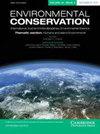阿富汗社区森林管理的障碍和机遇:对脆弱国家的考虑
IF 2.6
3区 环境科学与生态学
Q2 BIODIVERSITY CONSERVATION
引用次数: 1
摘要
2002年至2021年执政的阿富汗伊斯兰共和国政府(GIRoA)启动了建立基于社区的森林治理和建设当地自然资源管理能力的进程。这些努力与国际安全部队的存在和民间社会组织的动员同时进行,它们是为了响应社区保护和恢复经常退化的当地森林的愿望。通过了使森林保护和管理成为可能的立法,包括一项鼓励作为森林管理协会组织的地方社区用户团体参与管理的规定。到GIRoA时代结束时,约20名注册的fma与约400名其他fma一起在阿富汗各地的不同发展阶段开展业务。我们对相关政策文件的分析表明,在GIRoA时代制定的政策框架在社区资源管理的理想标准上得分较高。尽管随着当前阿富汗伊斯兰酋长国政权的建立,政治管理发生了变化,但GIRoA时代的影响可以作为一个起点,并可能对阿富汗农村社区及其赖以生存的自然资源产生持久的影响。轶事证据表明,尽管受到国际孤立和资金限制,但在目前的国家领导下,以社区为基础的森林管理可能会持续下去。在阿富汗开发的模式可能与其他脆弱国家相关,特别是在农村森林依赖社区拥有强大的地方机构(如协商会议)以及森林不易受到沉重采伐压力的情况下。本文章由计算机程序翻译,如有差异,请以英文原文为准。
Barriers and opportunities regarding community-based forest management in Afghanistan: considerations for fragile states
Summary The Government of the Islamic Republic of Afghanistan (GIRoA), in power during 2002–2021, initiated the process of instituting community-based forest governance and building local capacity for natural resource management. These efforts coincided with the presence of international security forces and the mobilization of civil society organizations, and they were in response to community aspirations to protect and restore often degraded local forests. Legislation was passed to enable forest protection and management, including a provision to encourage participatory management by local community user groups organized as Forest Management Associations (FMAs). By the end of the GIRoA era, c. 20 registered FMAs were operating with c. 400 others in various stages of development across Afghanistan. Our analysis of relevant policy documents revealed that the policy framework developed during the GIRoA era scores favourably on the ideal criteria for community-based resource management. Despite the change in political administration with the inception of the current Islamic Emirate of Afghanistan regime, the influence of the GIRoA era serves as a starting point and may have enduring influences on rural communities in Afghanistan and the natural resources that support them. Anecdotal evidence suggests that community-based forest management may persist under the current national leadership despite international isolation and funding constraints. The model developed in Afghanistan may be relevant to other fragile states, especially in contexts where rural forest-dependent communities have strong local institutions, such as shuras , and where forests are not prone to heavy extraction pressure.
求助全文
通过发布文献求助,成功后即可免费获取论文全文。
去求助
来源期刊

Environmental Conservation
环境科学-环境科学
CiteScore
5.20
自引率
3.70%
发文量
43
审稿时长
>36 weeks
期刊介绍:
Environmental Conservation is one of the longest-standing, most highly-cited of the interdisciplinary environmental science journals. It includes research papers, reports, comments, subject reviews, and book reviews addressing environmental policy, practice, and natural and social science of environmental concern at the global level, informed by rigorous local level case studies. The journal"s scope is very broad, including issues in human institutions, ecosystem change, resource utilisation, terrestrial biomes, aquatic systems, and coastal and land use management. Environmental Conservation is essential reading for all environmentalists, managers, consultants, agency workers and scientists wishing to keep abreast of current developments in environmental science.
 求助内容:
求助内容: 应助结果提醒方式:
应助结果提醒方式:


